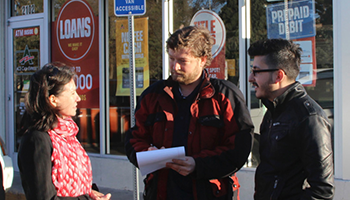UNM Law Professor Nathalie Martin takes on predatory lending
November 30, 2014

Credit: John Sumrow
Read the related story in the Albuquerque Journal about Professor Martin’s work.
By Carolyn Gonzales
Lawyers are happier when they find their own purpose, according to a study released earlier this year. Nathalie Martin, University of New Mexico professor of law, has found purpose – and happiness – both in teaching and in going after predatory lenders.
The New Mexico Supreme Court recently cited Martin’s article, "1,000% Interest – Good While Supplies Last: A Study of Payday Loan Practices and Solutions," published in the Arizona Law Review and by the UNM School of Law.
"I taught in our clinical program representing consumers with these loans that carried rates of 500 to 1,000 percent interest. As a financial lawyer, I think this should be illegal. The public thinks it should be, too," Martin said.
Ten years ago, she said, there were very few predatory lending establishments. “Now they are on every street corner. There are more of them than Starbucks, McDonald’s and Burger King combined,” she said.
Deregulating interest benefits payday lenders
History goes back further than that when it comes to usury laws – those laws that set limits on interest that can be charged. In 1978, a Supreme Court ruling essentially eliminated the usury caps. "Banks came into states with higher rates. The result has been the deregulation of interest, and along with it, the largest gap between what wealthy people pay and what the poor pay," Martin said.
Martin described a couple who had several loans and were having trouble paying rent because of them. "It started with them needing $100. They wrote a check to the lender for $120 that was dated to their next payday. The check would have been cashed on payday, but since they still couldn’t afford to cover it, they went in and paid the $20 of interest, but paid nothing on the principle. Over time, it added up to 400 percent interest annually," she said.
Most people who use these lending agencies are "consumers on the edge," according to Martin. "They are people who can’t afford to get kicked out a bank for overdrafts, which makes it hard for them to get back into the bank’s good graces." She said that some borrowers are on disability or social security, and therefore have a regular government check. "The lenders love to lend to people like that. Car title loan lenders prey upon that portion of the working poor without checking accounts," she said.
Formerly, members of the military were also victims of predatory lending, but since 2007, lenders cannot charge military personnel more than 36 percent interest.
Lenders prey on the working poor
Women and the working poor ages 25 to 35 are the general demographic of the typical payday loan client. "But these loans are used by people of all ages, with the average loan amount being $100 to $300. It’s easy to get the loan, with no underwriting required. It’s also easy to get sucked in," Martin said.
Payday and title loan advertising is targeted toward minorities and the working poor, she said. And the money earned by the lenders doesn’t stay in New Mexico. "The lenders are from out-of-state and that’s where the money goes," Martin said.
In 2009-10, Martin conducted an empirical study of borrowers outside payday loan establishments for a law review article. It was the article that was cited by the New Mexico State Supreme Court.
Borrowers are uneducated about interest rates
"We looked at the paperwork consumers signed and asked them if they understood what it meant. Seventy-five percent of the borrowers didn’t know what the interest rate of the loan was. Those who read the interest rate on the page thought it was a typo or an error," Martin said. "We knew we had to let the public know what was happening."
Martin spoke with a former employee of one of the lending agencies. "They were told to tell people that they are better off using their tax refunds at Walmart than to pay off their loan," she said.
Fighting back
The New Mexico Attorney General, through the Consumer Protection Division, took on the recent case on behalf of consumers, because a $100 loan shouldn’t cost $1,000 in over a year.
The Supreme Court held that a loan with an interest rate of 1,147 percent was unenforceable. "The lender had to pay back the consumers all except the principle plus 15 percent per annum," she said.
Unfortunately, the problem of high cost lending in New Mexico persists. In the law school clinic, they are seeing more cases; many with 500 percent interest rates. "Students are asking how to use the Supreme Court case to help consumers/clients. Ultimately, the legislature needs to limit interest on consumer loans," Martin said.
